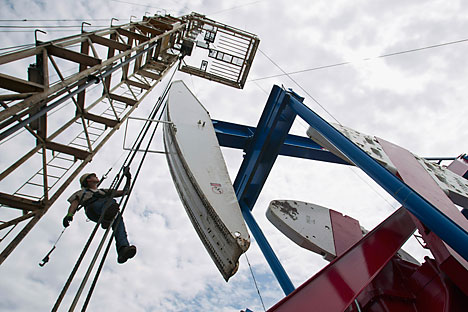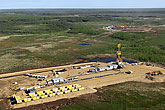Who can come to the rescue of Russia’s oil industry?

The dependence of Russia's oil sector companies on imports has critical implications. Source: AP
For the first time since the imposition of Western sanctions, Russia’s Ministry of Industry and Trade has prepared a list of measures on import substitution in the oil industry. However, such measures may not practical or feasible in the short-term, leaving the country with the option of turning to India, South Korea, China and Latin America for help.
The Russian officials are faced with a major challenge – the dependence of oil sector companies on imports has critical implications. Taking into account the hidden imports (when services are rendered by the Russian affiliates of foreign companies), the share of imported equipment and technology as a whole reaches 80 percent. Moreover, in certain categories, such as equipment for offshore projects or software, the share may exceed 90 percent, the document says.
Oil sector companies are most dependent on imports of pump and compressor equipment, equipment for geological and seismic exploration works, software and hardware systems and automation systems, as well as equipment and technology for offshore operations.
Formally, EU and U.S. sanctions prohibit supplying to Russia only equipment and technologies that can be used in the arctic, deep-water operations and in shale projects. However, in reality, the limitations also threaten production at the traditional fields, wrote the officials.
While Russia has more than 200 companies that produce oil and gas equipment, import substitution, in most categories, will not be possible earlier than 2018-2020, says the Ministry of Industry and Trade.
As of today, according to the government agency, out of the 45 categories, Russian companies can provide substitutes for only five.
The Ministry of Industry and Trade identified companies from India, China, South Korea, Singapore and Latin America as alternative suppliers. The required equipment can also be found in the United Arab Emirates, Saudi Arabia and Israel, but these countries cannot be considered as alternatives, because they “follow in the footsteps of the United States.”
Ministry of Industry and Trade even prepared a complete list of foreign companies, which could replace American and European suppliers. It contains one company from India (Indore Composite), which could act as a supplier of reagents, three from South Korea (Daewoo, LHE and KwangShin, compressors and plate-type heat exchangers), Belarus (Naftan, additives) and Singapore (NuStar, underwater equipment).
For the majority of categories, mostly Chinese manufacturers appear as alternative sources – several dozen companies in total, including CNPC, China National Logging Corporation, Shanghai Electric Heavy Industry, and Huawei.
Chinese manufacturers have, for several years already, been supplying small batches of mobile and fixed drilling rigs to the Russian market, said Sergey Sanakoev, executive secretary of the Russian-Chinese Chamber of Commerce. Moreover, 70-80 percent of Western equipment (steel products), is nevertheless produced in China, and only 20 percent – of the computer installations and software (brains) – are made in the West, he says.
Russian companies have to organize assembly plants for Chinese equipment in Russia, and create their own software. According to him, within the framework of the Russian-Chinese Chamber of Commerce, talks have already been held about such partnerships, while several projects are ready to go, and Western sanctions will only speed up this process.
Russian oil companies are already holding talks with new suppliers. In mid-October, Rosneft discussed the possibility of combining efforts with CNPC in oilfield services and the production of equipment. Due to sanctions, Gazprom Neft is also seeking alternative suppliers, including in Asia, said Vadim Yakovlev, first deputy general director of the company, in September, before the introduction of the latest round of sanctions.
“For oil sector companies, it will now be easier to work with Chinese manufacturers, but in the long and medium terms, there remains a danger of creating a new dependence on imports. China can simply dictate its own terms for the supply of equipment, as was as for the price,” says a manager of a company, which is a major Russian producer of oil and gas equipment, and who wished to remain anonymous.
As for price, the Chinese equipment is not much cheaper than that from the West, but the quality is inferior, says RBC’s source. “We need to focus on the localization of production of oil and gas equipment in Russia, in the first place, because of the fact that this is a strategic industry, and secondly, to create jobs here at home and generate tax revenues to the state budget. However, in the near future, we cannot do without the help of South-East Asian countries, Russian producers cannot cope alone with the production schedules in a large number of sophisticated equipment categories,” said RBC’s source.
This is an abridged version of an article first published by RBC Daily.
All rights reserved by Rossiyskaya Gazeta.
Subscribe
to our newsletter!
Get the week's best stories straight to your inbox


